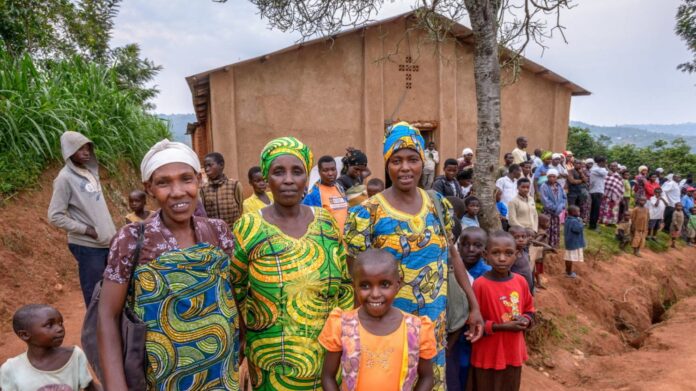A recent article by Okyere, et al., (2024) titled “Faith-based organizations and disaster management in informal urban Accra” published in Environmental Hazards, by Taylor & Francis shows that the rapid and unplanned urban expansion in Dome contributes to urban risks like flash floods and landslides.
“
Faith-Based Organizations in Accra’s Dome community play a critical role in disaster management, providing preparation, response, and recovery services during emergencies.
– Okyere, et al., (2024)
The study focuses on the role of Faith-Based Organizations (FBOs) in disaster management within the informal settlement of Dome, which is part of the Ga East Municipal Assembly (GEMA) in Ghana. Dome, the largest community in GEMA, has an estimated population of nearly 50,000. It is particularly vulnerable to storm surges and flooding due to its rapid and often unplanned urban expansion. This unregulated growth has led to the development of urban riskscapes, including flash floods and landslides, posing significant hazards to the local population. FBOs play a crucial role in disaster management in this context. These organizations are not only centers of spiritual support but also serve as community hubs that can mobilize resources and coordinate response efforts in times of crisis. Their involvement spans the entire disaster management cycle, from preparation and response to recovery. In preparation for potential disasters, FBOs often raise awareness among their congregations, promoting disaster readiness and community resilience. They might conduct training sessions on emergency response, first aid, and evacuation procedures. By engaging their members in these activities, FBOs help build a sense of community and shared responsibility. During disaster response, FBOs often provide immediate relief services, such as shelter, food, and medical assistance. Their established networks and trusted presence in the community enable them to respond quickly to emergencies. FBOs also play a key role in disseminating information, ensuring that residents are aware of safety measures and resources available during a crisis. Funding for FBOs’ disaster management activities comes from a variety of sources. Congregational offerings and tithes are common, but FBOs may also receive support through Islamic practices such as ‘Zakat,’ which is a mandatory form of charity, and ‘Sadaqah,’ a voluntary charitable donation. These financial resources allow FBOs to sustain their disaster management activities and continue serving the community. The study underscores the importance of recognizing and supporting the work of FBOs in disaster management. Integrating their efforts with broader municipal and national disaster response strategies can enhance the overall effectiveness of disaster preparedness and recovery in areas like Dome.
How the Study was Conducted
The authors employed a qualitative case study design was chosen due to the exploratory nature of the study. It was selected to better understand the sociocultural and religious factors influencing disaster management regimes. An interview guide with open-ended questions was developed to collect data. This allowed interviewees to freely express their opinions and experiences. Community leaders were contacted to identify suitable participants, including FBOs, local government representatives, and residents affected by disasters. The interview questions were vetted by the research team and analyzed for accuracy by seven experts with over ten years of experience in disaster management.
What the Authors Found
The authors found that dome has an estimated population of 49,790 and is particularly vulnerable to storm surges and flooding. The authors also found that the rapid and unplanned urban expansion in Dome contributes to urban risks like flash floods and landslides. In addition, Faith-Based Organizations (FBOs) play a crucial role in disaster management, helping with preparation, response, and recovery.
Why is this Important
Community Resilience: By recognizing and integrating FBOs, disaster management efforts can be more effective. FBOs often have strong community ties and can mobilize resources quickly during emergencies.
Local Knowledge and Trust: FBOs are embedded in the local context, understanding the community’s needs, culture, and vulnerabilities. Their presence builds trust among residents, making it easier to disseminate disaster preparedness information.
Complementary Efforts: FBOs complement government and NGO efforts. While formal institutions may face bureaucratic challenges, FBOs can act swiftly and provide immediate relief.
Holistic Approach: FBOs address not only physical needs but also emotional and spiritual well-being. This holistic approach is crucial during and after disasters.
Sustainable Solutions: Integrating FBOs ensures long-term sustainability. They continue their work beyond immediate crises, promoting disaster risk reduction and community resilience.
What the Authors Recommend
- The authors recommend fostering collaboration between FBOs, local government agencies, and non-governmental organizations (NGOs). Integrating FBOs into disaster management planning and response efforts can enhance overall effectiveness.
- The authors recommend providing training and capacity-building programs for FBOs. This includes disaster risk reduction, emergency response protocols, and community engagement strategies.
- The authors emphasize that FBOs can play a vital role in disseminating disaster preparedness information. Encourage them to conduct awareness campaigns within their congregations and the broader community.
- The authors also emphasize on recognizing the diversity of FBOs (e.g., Christian, Islamic, traditional) and involve them in disaster management discussions. Tailor strategies to address specific cultural and religious contexts.
In summary, Faith-Based Organizations (FBOs) play a pivotal role in disaster management within the informal urban setting of Accra’s Dome community. Their deep-rooted connections, cultural insights, and resource mobilization capabilities are instrumental in addressing the urban risks associated with rapid, unplanned expansion. Through awareness campaigns, emergency response training, and holistic support, FBOs not only provide immediate disaster relief but also contribute to long-term community resilience. By fostering collaboration with local government and NGOs, integrating diverse religious perspectives, and promoting sustainable solutions, FBOs are helping to transform disaster-prone areas into more prepared and cohesive communities. The importance of their role in the broader disaster management landscape cannot be understated, serving as a model for integrating faith-based initiatives into urban disaster preparedness and response efforts.
















 The African Research (AR) Index is a comprehensive scholarly directory and database focused explicitly on journal publishers that publish and disseminate African research.
The African Research (AR) Index is a comprehensive scholarly directory and database focused explicitly on journal publishers that publish and disseminate African research.

